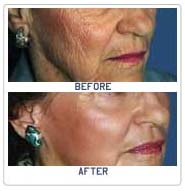In laser skin resurfacing a laser is used to remove areas of damaged or wrinkled skin, layer by layer. The procedure is most commonly used to minimize the appearance of fine lines, especially around the mouth and the eyes. However, it is also effective in treating facial scars or areas of uneven pigmentation. Laser resurfacing may be performed on the whole face or in specific regions. Often, the procedure is done in conjunction with another cosmetic operation, such as a facelift or eyelid surgery.
 In addition to laser procedures, many resurfacing methods are available, including botox injections, chemical peels, injectible fillers, and surgical procedures (e.g. facelift, browlift, blepharoplasty). Individuals looking to rejuvenate their skin should consider factors such as the ease, effectiveness, and safety of the procedure; post-procedural effects; potential for complications; length of recovery; and duration of benefits.
In addition to laser procedures, many resurfacing methods are available, including botox injections, chemical peels, injectible fillers, and surgical procedures (e.g. facelift, browlift, blepharoplasty). Individuals looking to rejuvenate their skin should consider factors such as the ease, effectiveness, and safety of the procedure; post-procedural effects; potential for complications; length of recovery; and duration of benefits. Age
A patient’s age may also be a useful general guideline for choosing skin procedures. Some physicians recommend chemical peels for patients in their thirties, collagen or fat implants for patients over age 40, and laser resurfacing after age 50.The Laser Skin Resurfacing Procedure
In the weeks before your procedure, your doctor may suggest that you apply special creams, lotions or gels to prepare your skin. You may also be given certain oral medications to take before your treatment such as antiviral, antibacterial and/or anti-yeast medication to prevent complications such as the awakening of a dormant virus.Your doctor may perform laser skin resurfacing in the office, an outpatient surgery center or a hospital. Typically you would receive topical anesthesia, local anesthesia, and intravenous sedation so that you are awake, but not fully aware. You might even receive general anesthesia for treatment of deeper layers of the skin. The type of anesthesia is based on the laser that is used and the level of your treatment.
Treatment time ranges from a few minutes to an hour and a half, depending on the amount of resurfacing you need.
The doctor moves the laser precisely over the treatment area. Depending on the depth of the wrinkle, scar or discoloration, the laser may be moved over the area repeatedly.
The laser penetrates and removes the number of outer skin layers necessary to uncover the layer not affected by imperfections. It feels like a rubber band is being gently snapped against your skin. Once that layer is exposed, healing can begin to rebuild new skin that looks younger and does not have the imperfections.
Before The Surgery
Facial rejuvenation is very individualized. That's why it's important to discuss your hopes and expectations with a board-certified plastic surgeon who has experience with many different types of surgical and non-surgical facial procedures.In your initial consultation, your plastic surgeon will evaluate your face - the skin, the muscles and the underlying bone - and discuss your goals for the surgery. Your doctor will help you select a treatment option based on your goals and concerns, your anatomy and your lifestyle.
Your surgeon will ask you about your medical history, drug allergies, and check for conditions that could cause problems, such as active skin infections or non-healed sores from injuries. Collagen injections are generally off limits for pregnant women, individuals who are allergic to beef or bovine products, patients who suffer from autoimmune diseases, and those who are allergic to lidocaine (the anesthetic agent contained in the syringe with the collagen material). For more specific information about the contraindications and risks of collagen use, ask your doctor for the manufacturer's brochure for patients.
Insurance usually doesn't cover cosmetic procedures. However, if your injectable treatment is being performed to treat a scar or indentation from an accident or injury, you may be reimbursed for a portion of the cost. Check with your insurance carrier to be sure.
Aftercare
You may experience some temporary side effects, including swelling and mild discomfort. This can be controlled with ice packs and medications prescribed by your surgeon. There is rarely any bleeding. Arrange for someone to drive you home from the plastic surgery facility after the procedure and possibly assist you for a day or two afterwards if you have had an aggressive procedure that required general anesthesia.You may develop a red, crusted appearance on the treated area for three to 10 days. Do not pick at the crusts or you could develop scars.
Your skin may look bright pink for weeks. Avoid sun exposure until all skin color has returned to normal. Your doctor will likely tell you to generously apply sun block with a sun protection factor of 30 or more. You are usually allowed to wear make-up one to two weeks after the treatment.
None of these rules are written in stone. Your doctor may give you different instructions based on your skin type, your choice of laser and how your skin reacts to the treatment.
After the procedure, your doctor will cover your skin with petroleum jelly or another protective ointment. Sometimes, dressings, tape or a bandage may be needed.
Risks of Laser Skin Resurfacing
No procedure is risk-free. The risks of laser skin resurfacing include burns and other injuries associated with the laser's heat, scarring, abnormal pigmentation and infection. In rare cases, dormant viruses such as herpes or infections may be triggered by laser treatment.For more information, medical assessment and medical quote
as email attachment to
Email : - info@wecareindia.com
Contact Center Tel. (+91) 9029304141 (10 am. To 8 pm. IST)
(Only for international patients seeking treatment in India)










